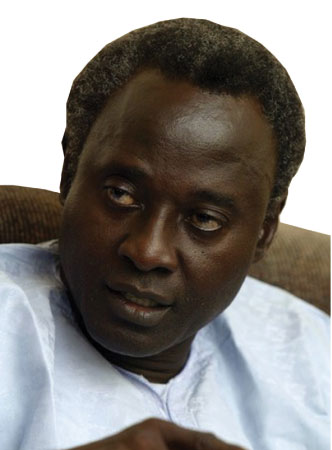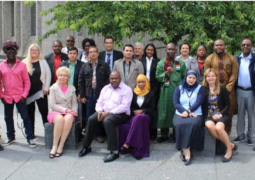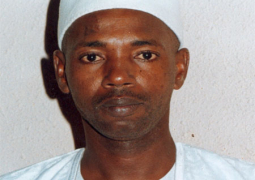
With barely three months to the presidential election, the question as to whether the country’s opposition camp will pose any credible threat to the ruling APRC continues to linger in the minds of many Gambians.
While analysts and most Gambians argue that, unless they come together, the opposition will not pose a threat to incumbent President Yahya Jammeh’s 17 years rule, others in the opposition also have the belief that this can be a reality.
In this interview with Halifa Sallah, Secretary General of the opposition Peoples Democratic Organisation for
According to Sallah, who contested for the presidency under the PDOIS ticket in the 2006 elections, the subject of establishing a united front is not a new idea.
Below we reproduce the full text of the interview we had with Halifa:
The Point: So much has been said and written about the possibilities of forming a united front by opposition parties in the country ahead of the scheduled presidential, parliamentary and local government polls. What is PDOIS’s position on this?
Halifa: PDOIS’ position is very clear. The current government has served for 17 years. In our view, that is enough for any single person to show what he or she could do for a country. It is clear that since 1965, only two persons have served as head of state. It is a popular view that a term limit should be introduced so that no person would occupy the seat of a President for more than two terms. This is the mood of the country since the time of the referendum.
It is the APRC that does not subscribe to a term limit. I have heard one a stalwart of theirs who claims to be a youth leader from West Coast Region saying that elections constitute a waste of resources. In short to him, to spend 100 million dalasis every five years in order to determine which Gambian is reliable enough to be entrusted with five billion dalasis annually to spend on our behalf for our development, is a waste of time. You would agree with me that anybody who thinks like this in the 21st Century should not be a citizen of a sovereign Republic. Apparently, parties that do not subscribe to the empowerment of the sovereign people to know their rights, thrive on the ignorance of their membership. This is why they clap and shake their heads in approval whenever some say that elections are a waste of resources. They would like Gambians to be subjects rather than sovereign owners of the motherland.
The reason why we subscribe to a United Front is because of our realisation that the results of the 2006 elections reveal that voter apathy has gripped the Gambian electorate. In short, over 270,000 people saw the APRC, UDP and NADD but did not vote at all. Hence those who did not vote at all are in the majority and could have made any one to be President of the
Our initial position is that we should put our party manifestoes aside and adopt a transitional arrangement which would enable only one candidate to be elected through an Inter party primary to stand for the opposition against the incumbent. This person would help us to put an end to the tradition of holding political office for decades by accepting to be in office only for a period of 2 to 5 years so as to build the foundation for a genuine democratic society which would not exclude anyone on the basis of gender, ethnicity, or past political affiliations and then open both the public and private media to all the political and civic organisations in the country so that a genuine multi-party system could be put in place before the end of the transition. The transitional government would include in its agenda Constitutional reform. We include a two year transitional period so that APRC would not claim that what they did in two years could not be done by us within the same time frame. We are fully confident that any Presidential candidate for the opposition who would be willing to swear before the whole nation that he or she would hold office only for two years just to enable the country to ensure proper utilization of public resources and build a genuine multi-party system, would certainly deserve a place equal to Nelson Mandela in world history. I do not see how such a person could lose an election if he or she is genuine.
The Point: Is this something that can work out with just few months to the polls? If so how?
Halifa: I want to remind people that in 1996, parties finished registering in August, barely one month before the September Presidential Elections. A month in politics could shape the whole destiny of a people if the right decisions and actions are taken. The subject of establishing a united front is not a new idea. We started our campaign for a United Front three years ago. There is no doubt that many people support the holding of a cross-party primary which is the surest way of guaranteeing cross-party voting for a candidate. However to accommodate the views of others we are of the view that a nationwide primary could be replaced by a National Conference or Convention which would form the basis of a non partisan Selection Committee that would elect the Candidate.
The Point: How?
Halifa: That is simple. Participating parties could select equal delegates, male and female from the seven administrative areas and then agree to a list of participants who are non-partisan from all over the country and mandate them to elect a winnable candidate who could best facilitate a successful transition to a third Republic that would guarantee a genuine multi-party system and limited executive powers and tenure of office. Once the will is there, the way will not be difficult to find.
The Point: The PDOIS was recently holding rallies around the country. What were the messages that you were trying to put across to the public?
Halifa: We wanted to take exception to the messages emanating from the platforms of the APRC that the people would vote for progress by voting for the APRC and for retrogression by voting for the opposition. We showed what our policies would be if we were at the helm or if we are part of a genuine United Front.
The key points we drove home is that no one would be able to judge the APRC government’s record unless one knows how much money it has been given to as revenue for the past seventeen years, how much it received as loans and grants and how much it received as gifts and what had been done with the wealth for the past seventeen years. We explained that this year alone, the sum that is to be put in government coffers is over 4.5 billion or 4500 million dalasis.
We informed the people that the government goes on borrowing every year because of its deficits and now owes the local financial institutions over 9 billion or 9000 million dalasis.
We argued that since the Government cannot meet its own day to day financial needs, it has to take loans to build infrastructure which raised the indebtedness of the country to 22 billion dalasis thus compelling the government to seek debt relief and is now classified among the heavily Indebted Poor Countries of the world.
We gave examples that a large portion of the 9 billion from financial institutions should have been invested to build the productive base of the private sector to generate employment and government revenue. We emphasised that the private sector has nothing to fear from a PDOIS Government or any United Front it is a part of. We indicated that the Government is relying more and more on taxes than sovereign national wealth from royalties or shares from mining from Sanyang and other areas that should have been located by now. We gave examples of how we could have managed public enterprises like GPTC which had 22 buses after the construction of the
We indicated very clearly that the over 185,000 children who are in our primary schools, the 67,000 children who are in our Upper Basic schools and the 27, 000 students who are in our high schools would all be out within a period of 12 years. We asked how the 300,000 children would find work without the development of the productive base of the economy. We informed people that pensioners and wage earners are living from hand to mouth and over 60 percent of the population is living in abject poverty. We explained how poverty leads to dependency and political patronage. We mentioned the steps we had taken to influence the settlement of the crises in the world. In short, we looked into many civil issues such as detention without trial and the respect for fundamental rights and freedoms, the witchcraft fiasco, political issues such as the cause of voter apathy, economic issues such as high cost of living and low earnings, social issues such as the inability of youths to find a family because of unemployment as well as cultural and ecological issues which affect our lives.
The Point: How do you see the reception of the people during these rallies?
Halifa: We called it public sensitisation campaigns. Those who attend always become more inspired. We often hold two to three spot meetings in an area. Few hundreds attend but if you multiply it with the number of meetings, thousands are sensitized. It is often more interactive than big rallies since people could ask questions. We used that in Serrekunda Central in 2002 and gave my opponent a big surprise. This time the APRC is not underestimating the powerful impact of sensitisation campaigns. This is why they are asking the people to go out and vote for them knowing fully well that even though President Jammeh won in 2006, those who did not vote could have removed him from office if they had voted. The party is rightly conscious of the fact that their victory was neither decisive nor respectable. Hence they are calling for a decisive and respectable victory. People are still talking about the sensitisation campaigns and are asking for more. However, time is not on our side. This is why we are planning to hold big rallies as a show of strength of the support base for a United Front beginning on 10 September opposite
The Point: What in your candid opinion do you think is the way forward for all opposition parties in the country?
Halifa: One does not need to be a Social scientist to note that the APRC has been deliberately trying to negate a viable multiparty system by displaying Zero tolerance for any attempt to broadcast the political views of the opposition in the National Media or Non-Government Radio Stations. It has tried to negate any separation between state and party thus transforming civil servants into mouth-pieces of the ruling party as could be clearly seen on TV in the case of GRTS workers serving as translators during rallies and repeating derogatory remarks against the opposition. The second round of voting is removed to make the opposition to lose by splitting the votes of those who want change, What we need is for each opposition party to formulate a proposal on how to establish a United Front. We could then call a joint rally in all the administrative areas in September to discuss the various proposals and tap the reaction of the public. This should be followed by a National Conference by the end of September to elect a Candidate through the means agreed upon. The whole month of October would be available to roam the whole country to introduce the Candidate and the conditions for electing him or her. This to me is a viable way forward. At least I can declare that both Sidia Jatta, my other colleagues and my very self could give support to a United Front without a precondition to be given the post of a Vice President or a Minister as long as an acceptable transitional arrangement is in place.
We are also willing to support a credible man or woman who may not even be a member of a political party. If all of us start form such a premise, we will undoubtedly establish a credible United Front which would either win an election or build an opposition force that the ruling party would have to respect and negotiate with to enlarge the democratic space in the country. What we will not be part of is a United Front that will fail to win and then emerge fragmented and weakened by self denial and blame game.


